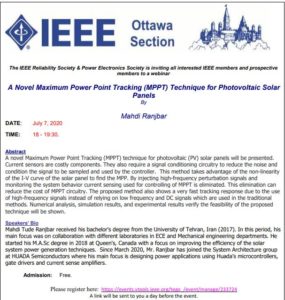Events

The virtual series of IEEE Women in Engineering International Leadership Conference (WIE ILC) 2020.
The IEEE WIE ILC Virtual Series will take place throughout June 2020,
offering 1-hour sessions, live panel discussions, virtual networking
opportunities, and an on-demand library for you to browse when it’s
convenient for you. Registration is free!
Visit http://ieee-wie-ilc.org/virtual2020/ for more information.
#IEEEWIE

Presented by the IEEE Ottawa Section MTT-S/AP-S Chapter & Young ProfessionalsÂ
Accelerating 5G Design Innovation Through SimulationÂ
                                  By
Dr. Laila SalmanÂ
                               Ansys Inc.
                     Date: Wednesday, June 10, 2020
                        Time: 2:30 PM – 4:00 PM
                                  Location: Online
           Â
Abstract
5G connectivity is the next technological revolution. This pervasive, ultrafast compute network will connect billions of devices with data on-demand. It will drive economic expansion in many sectors, spawn new products and services, and transform our lives as we know it. Yet, before 5G can deliver on its promises and quality of service (QoS) metrics, wireless systems designers and engineers must overcome sizable challenges. Â
Ansys 5G simulation solutions empower these individuals to solve the complexities impeding device, network and data center design. Ansys 5G simulation solutions provide electromagnetics, semiconductor, electronics cooling and mechanical analysis tools to accurately simulate 5G radio and related technologies. The multi-solution platform leverages high-performance computing that can be deployed across the enterprise, allowing designers and engineering experts to collaborate more effectively.Â
This seminar will highlight the following 5G engineering challenges:Â
·  End User Equipment Â
  o  multi-frequency band antenna integrationÂ
  o   modeling of mm-wave array antennas Â
  o   RFI, EMI & Desense MitigationÂ
·  Base-Station Antenna ModelingÂ
  o  Full Communication Analysis in Electrically Large & Complex EnvironmentÂ
  o  RFI, Data Coverage & ElectroThermal ReliabilityÂ
Speaker Bio
Dr. Laila Salman received the B.S. and M.S. degrees in electronics and communication engineering from Cairo University, Egypt, and the PhD. Degree in electromagnetic and antenna design from the University of Mississippi. She also worked as a post-doctoral student at the Université de Quebec en Outaouais, Gatineau, Canada till 2010. Her research was on dielectric resonator antennas, wearable antennas, microwave and millimeter-wave circuits and systems, microwave imaging for early detection of breast cancer and scattering from left-handed metamaterials. Dr. Salman joined Ansys Canada Ltd. in August 2010 as a Lead Technical Services Specialist for High Frequency Applications.
Registration: Please use the link in the registration section to sign up for the event.
To join event use the following link.

|
The IEEE Reliability Society & Power Electronics  A Novel Maximum Power Point Tracking (MPPT) Technique for Photovoltaic Solar Panels By  Mahdi Ranjbar DATE:      July 7, 2020 TIME:       18 – 19:30.     A  Mahdi
A link will be sent to you a day before the event. Â |

Registration is required. A link to the event will be sent to those registered closer to the event date.
Register here: https://www.eventbrite.ca/e/resource-management-for-massive-connectivity-in-future-wireless-networks-tickets-111059596242
About this Event
Future wireless networks (beyond 5G/sixth-generation (6G) networks)
are envisioned to support 3D communication by integrating terrestrial
and aerial networks. The objective is to provide connectivity to a large
number of devices (known as massive connectivity), to support
substantial traffic demands, and expand coverage. However, effective
resource management in future wireless networks is a challenge because
of massive resource-constrained devices, diverse quality-of-service
(QoS) requirements, and a high density of heterogeneous devices. In this
seminar, I will present my recent research progress which is focused on
communication networking aspects of the Internet of Things (IoT), with
emphasis on algorithm design, network architecture development, and
system-level performance analysis. I will provide a brief discussion on
my three most significant contributions which focuses on the design of
novel algorithms and communication protocols for IoT networks, that have
both (i) enhanced network performance, in terms of spectrum efficiency,
coverage, and energy efficiency, and (ii) satisfied a wide range of IoT
devices’ requirements and constraints. I will then share long-term goal
of my research program which is to develop efficient and low complexity
resource management schemes to tackle the challenges of seamless
connectivity of heterogeneous devices anytime and anywhere. Finally, I
will present my short-term objectives in the next five years which are
to develop resource management schemes for massive connectivity in
future terrestrial networks, aerial networks, and self-sustainable
networks (SSNs) while considering different objectives and constraints,
including network scalability, reliability, latency, efficiency
(spectral usage and energy consumption), and complexity.
BIOGRAPHY
Waleed
Ejaz (S’12-M’14-SM’16) is an Assistant Professor in the Department of
Applied Science & Engineering at Thompson Rivers University,
Kamloops, BC, Canada. He is also the founding director of Next
Generation Wireless Networks (NEWNET) research laboratory. Previously,
he held academic and research positions at Ryerson University, Carleton
University, and Queen’s University in Canada. He received the B.Sc. and
M.Sc. degrees in Computer Engineering from the University of Engineering
and Technology, Taxila, Pakistan and the National University of
Sciences and Technology, Islamabad, Pakistan, and the Ph.D. degree in
Information and Communication Engineering from Sejong University,
Republic of Korea, in 2014. He has co-authored over 90 papers in
prestigious journals and conferences, and 3 books. His current research
interests include Internet of Things (IoT), energy harvesting, 5G and
beyond networks, and mobile edge computing. He is an Associate Editor of
the IEEE Communications Magazine, IEEE Canadian Journal of Electrical
and Computer Engineering, and the IEEE ACCESS. Dr. Ejaz completed
certificate courses on “Teaching and Learning in Higher Education†from
the Chang School at Ryerson University. He is a registered Professional
Engineer (P.Eng.) in the province of British Columbia, Canada. Dr. Ejaz
is a senior member of IEEE, member of ACM, and ACM distinguished
speaker.
#IEEEWIEOttawa

Webinar: Role of the Smart Grid in Facilitating the Integration of Renewables
Speaker: Prof. Dr. Saifur Rahman, Director, Virginia Tech Advanced Research Institute, USA, IEEE Power & Energy Society (PES) President 2018-2019, IEEE PES Distinguished Lecturer
Date/Time: Tuesday, July 28, 2020, 6:30 pm – 7:30 p.m. EDT
Admission: Free, but registration is required: https://events.vtools.ieee.org/m/234594
For more details, please visit: https://www.ewh.ieee.org/soc/pes/ottawa
Abstract – With the focus on environmental sustainability and energy security, power system planners are looking at renewable energy as supplements and alternatives. But such generation sources have their own challenges – primarily intermittency. It is expected that the smart grid – due to its inherent communication, sensing and control capabilities – will have the ability to manage the load, storage and generation assets (including renewables) in the power grid to enable a large-scale integration of distributed generation. In a smart grid, information about the state of the grid and its components can be exchanged quickly over long distances and complex networks. It will therefore be possible to have the integration of sustainable energy sources, such as wind, solar, off-shore electricity, etc. for smoother system operation. But in order for this to be possible, the electric utility will have to evolve, and change their ways of operation to become an intelligent provider of these services. This lecture introduces the operational characteristics of renewable energy sources, and various aspects of the smart grid – technology, standards and regulations. It also addresses the interplay among distributed generation, storage and conventional generation to provide an efficient operational strategy in the context of the smart grid.

